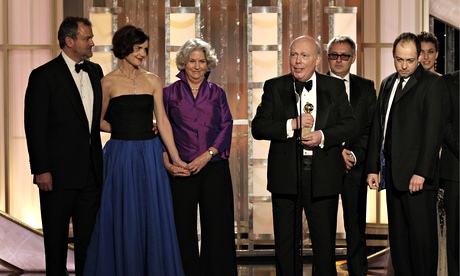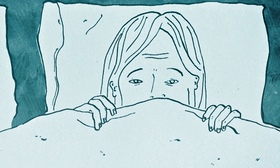
George Clooney is to “star” in Downton Abbey. Mr Charisma, King Celebrity himself, will play the role of an American guest at a wedding at the country estate, alongside Michelle Dockery (Lady Mary) and Hugh Bonneville (the Earl of Grantham). The programme makers are so overcome they’re virtually wetting themselves with excitement: “This is the biggest moment in Downton history and shows it’s now the biggest drama in the world.” Fetch the sherry, Carson – and the bedpan while you’re at it.
A moment of great celebration for British culture? Not quite. Read the small print and you soon discover that Clooney isn’t appearing in the actual show. He’s in a sketch for an ITV Christmas charity appeal. The same fundraising spot previously featured Cheryl Cole sitting in Coronation Street’s Rovers Return with a bucket of champagne.
But it isn’t wholly hyperbole that Downton is one of the most successful TV series ever. You can watch the show in Persian, Russian and Korean, and it has an estimated global audience of 160 million. On a cycling trip to Angkor Wat, in Cambodia, the actor Jim Carter, who plays the butler, was greeted by a throng of tourists screaming “Mr Carson!”.
The series did well abroad immediately and, as series five starts in the UK on Sunday, the upward curve of viewers shows no sign of flattening. The US in particular has taken the series to heart: Ben Stiller, Dustin Hoffman, Tom Hanks and Katy Perry are all fans, while Michelle Obama requested early previews of the last series. Should you wish, you can buy Downton Abbey wine, soap and jewellery.
Yet Downton is just the latest in a long line of conservative cultural phenomena that get lapped up internationally and end up representing Brand Britain, whether we like it or not. From Merchant Ivory and Jeeves and Wooster to Four Weddings and a Funeral and Notting Hill via royal baby fever, our best-known cultural exports are painfully reinforcing “olde worlde” class stereotypes.
And let’s not kid ourselves that what we’re broadcasting to the world here is great drama. What we’re actually exporting is nostalgia, an unhealthy obsession with class, and a peculiarly dusty form of conservatism. It turns out that people can’t get enough of these things.
One sign that Downton is received overseas as something closer to documentary rather than glossy fiction is that no one has tried to do their own version. When the Americans “acquire” Broadchurch or The Office, they remake it. It would not occur to anyone to remake Downton because it is already seen as the most accurate portrayal of Britishness possible.
In some ways this is a compliment; in other ways, it is depressing. Abroad (and perhaps closer to home, too) Downton is an exercise in wish fulfilment. Viewers want this world and the class order it represents to exist. They wonder whether they themselves would be “upstairs” or “downstairs”. They want to visit the real Downton, Highclere Castle in Hampshire.
The series’ creator, Julian Fellowes, is rather coy about all this. The appeal of the show, he says, lies in something far more simple and less political: “Most of the stories are about emotional situations that everyone can understand.” But it is not these stories that capture viewers’ imaginations. It is the class relationship between the characters.
It also reinforces the myth that to be British means to love the Queen, doff your cap and stop for afternoon tea at four o’clock. In China there is, apparently, the “fastest-growing market in the world for British butlers”. A British businessman based there was reported as saying that last year he “must have had more than 100 calls congratulating me on the birth of Prince George”. This is not completely Downton’s fault, but it’s a crucial part of the narrative.
Talking about the BBC’s great tradition of TV exports, the corporation’s director general, Tony Hall, has said that the “soft power” influence of British telly abroad has a diplomatic effect equal to that of the armed forces. This is true of Downton: it’s a deadly weapon, shooting to kill every radical bone in your body as you yearn for the return of dowagers, entails and primogeniture.
At the recent TUC conference in Liverpool the general secretary, Frances O’Grady, described Britain as “becoming like Downton Abbey”, in the sense that the “living standards of the vast majority are sacrificed to protect the high living of the well-to-do” – a place where “class prejudice” is respectable. True or not, this is definitely the narrative that sells best in fictional form abroad.
What Downton’s international fans believe they are buying into, then, is what the New York Times described as “a bit of Britain where the sun still never sets”. Five series in, it shows no sign of stopping. My eye mask, Anna, before I have one of my turns.

















Comment from the paper
Hala Al-Dosari: King Abdullah’s gone, but the Saudi monarchy’s pact with the mosques remains
Martin Rowson: Martin Rowson on the death of King Abdullah – cartoon
Christie Watson: If I were queen for a day, this would be a month of real food, not detoxers’ nauseous green slime